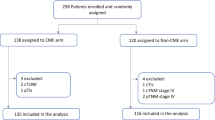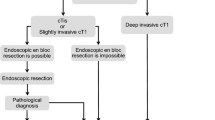Abstract
Background. The maintenance of modern therapeutic principles requires a proper case load to achieve acceptable surgical results. This may obligate administrative reorganization to overcome these problems and to provide an adequate level of cancer surgery.
Aim. To assess the surgical results of patients coming for surgery for colorectal cancer in a low-volume non-academic unit during the past 15 yr.
Methods. 458 consecutive patients referred for surgery between 1988 and 2001 in Kanta-Häme Central Hospital in Finland were analyzed regarding their disease, mode of surgery, and the immediate and long-term result. The data were collected from patient journals and from the National Centre of Statistics and analyzed in two successive periods.
Results. The number of patients with a localized disease (Dukes A + Dukes B) decreased during the followup from 49% to 45%. A curative procedure was achieved in 68% in the first half and in 73% in the second half of the observation period. The immediate mortality was 5% and 2% in the two periods, respectively. The corrected 5-year survival according to the Dukes Classification was 92% (A), 69% (B), 41% (C), and 6% (D). In curative surgery for rectal cancer, the incidences of local recurrence decreased from 21% to 9% (NS) and the use of permanent colostomy from 59 to 42% (NS).
Conclusions. Acceptable immediate and long-term results in curative surgery for colorectal cancer can be achieved in a low-volume surgical unit. Nevertheless, owing to the low volume, the improvement of the results obligates team-based institutional specialization and careful consideration about the extensiveness of the primary procedure in case of cancer obstruction.
Similar content being viewed by others
References
Luft HS, Bunker JP, Enthoven AC. Should operations be regionalized? The empirical relation between surgical volume and mortality. N Engl J Med 1979;301:1365–1369.
Birkmayer JD, Finlayson WV, Birkmayer CM. Volume standards for high-risk surgical procedures: potential benefits of the Leapfrog initiative. Surgery 2001;130:415–422.
Committee of Quality of Health Care in America and the National Cancer Policy Board. Interpreting the Volume-Outcome Relationship in the Context of Health Care Quality. Washington DC: Institute of Medicine, 2000.
McArdle CS, Hole D. Impact of variability among surgeons on postoperative morbidity and mortality and ultimate survival. BMJ 1991;302:1501–1505.
Holm T, Johansson H, Cedermark B, Ekelund G, Rutqvist L-E. Influence of hospital and surgeon related factors and outcome after treatment of rectal cancer with or without preoperative radiotherapy. Br J Surg 1997;87:657–663.
Parry JM, Collins S, Mathers J, Scott NA, Woodman CBJ. Influence of volume of work on the outcome of treatment for patients with colorectal cancer. Br J Surg 1998;86:475–481.
Porter GA, Soskolne CL, Yakimets WW, Newman SC. Surgeon-related factors and outcome in rectal cancer. Ann Surg 1998;227;157–167.
Martling A, Cedermark B, Joyhansson H, Rutqvist LE, Holm T. The surgeon as a prognostic factor after the introduction of total mesorectal excision in the treatment of rectal cancer. Br J Surg 2002;89(8):1008–1013.
Coligher JC. Surgery of the Anus, Rectum and Colon. 5th Ed., London: Balliere-Tindall, 1984.
Heald RJ, Husband EM, Ryall RDH. The mesorectum in rectal cancer surgery—the clue to pelvic recurrence? Br J Surg 1982;69:613–616.
Heald RJ, Ryall RDH. Recurrence and survival after total mesorectal excision for rectal cancer. Lancet 1986;ii:1479–1482.
Påhlman L. Perioperative radiation therapy. World J Surg 1997;21:733–740.
Paajanen H, Härkönen N. Kolorektaalisyövän leikkaushoidon tulokset Mikkelin keskussairaalassa. Duodecim 2001;117:1907–1913.
Pakkastie T, Luukkonen PE, Järvinen HJ. Anterior resection contols cancer of the rectum as well as abdominoperineal excision. Eur J Surg 1995;161:833–839.
Vironen JH, Halme L, Sainio P, et al. New approaches in the management of rectal carcinoma result in reduced local recurrence rate and improved survival. Eur J Surg 2002;168:158–164.
Jorgensen OD, Kronborg O, Fenger C. A randomized study of screening for colorectal cancer using faecal occult blood testing. Results after 13 years and seven biennial screening rounds. Gut 2002;50:29–32.
Malila N, Anttila A, Elovainio L, et al. Screening of GI-cancer in Finland (In Finnish: Suolistosyövän seulonta ja vaikuttavuuden arviointi Suomessa). Duodecim 2003;119:890–896.
Rhodes JB, Holmes FF, Clark GM. Changing distribution of primary cancers in the large bowel. JAMA 1977;238:1641–1643.
Levi F, Randimbison L, La Vecchia C. Trends in subsite distribution of colorectal cancers and polyps from the Vaud Cancer Registry. Cancer 1993;72:46–50.
Kotake K, Honjo S, Sugihara K, et al. Changes in colorectal cancer during a 20-year period: an extended report from the multi-institutional registry of large bowel cancer. Japan. Dis Colon Rectum 2003;46:S32-S43.
Järvinen H. Paksu- ja peräsuolen syöpä. Kirjassa: Gastroenterologia, 2.painos. Kustannus Oy Duodecim. Helsinki 2000.
Martling AL, Holm T, Rutgvist LE, Moran BJ, Heald RJ, Cedermark B. Effect of a surgical training programme on outcome of rectal cancer in the County of Stockholm. Stockholm Colorectal Cancer Study Group, Basingstoke Bowel Cancer Research Project. Lancet 2000;356:93–96.
Wibe A, Syse A, Andersen E, Tragli S, Myrvold HE, Soreide O. Oncological outcomes after total mesorectal excision for cure for cancer of the lower rectum: anterior vs. abdominoperineal resection. Dis Colon Rectum 2004;47(1):48–58.
Muto T, Oya M. Recent advances in diagnosis and treatment of colorectal T1 carcinoma. Dis Col Rectum 2003;46:S89-S93.
Eriksen MT, Wibe A, Syse A, Haffner J, Wiig JN. Norwegian Rectal Cancer Group, Norwegian Gastrointestinal Cancer Group. Br J Surg 2004;91(2):210–216.
Wibe A, Rendedal PR, Svensson E, et al. Prognostic significance of the circumferential resection margin following total mesorectal excision for rectal cancer. Br J Surg 2002;89(3):327–334.
Wibe A, Moller B, Norstein J, et al. A national strategic change in treatment policy for rectal cancer—implementation of total mesorectal excision as routine treatment in Norway. A national audit. Dis Colon Rectum 2002;45(7):857–866.
Wibe A, Eriksen MT, Syse A, Myrvold HE, Soreide O. Total mesorectal excision for rectal cancer — what can be achieved by a national audit? Colorectal Disease 2003;5(5):471–477.
Beart RW, Steele GD Jr, Menck HR, Chmiel JS, Ocwieja KE, Winchester DP. Management and survival of patients with adenocarcinoma of the colon and rectum: a national survey of the Commission on Cancer. J Am Coll Surg 1995;181(3):225–236.
Heald RJ, Karanjia ND. Results of radical surgery for rectal cancer. World J Surg 1992;16:848–857.
Heald RJ, Moran BJ, Ryall RDH, Sexton R, MacFarlane JK. Rectal cancer. The Basingstoke experience of total mesorectal excision, 1978–1997. Arch Surg 1998;133:894–899.
Paty PB, Nash GM, Baron P, et al. Long-term results of local excision for rectal cancer. Ann Surg 2002;236(4):522–529.
Author information
Authors and Affiliations
Corresponding author
Rights and permissions
About this article
Cite this article
Paimela, H., Lindström, O., Tomminen, T. et al. Surgery for colorectal cancer in a low-volume unit. Int J Gastrointest Canc 35, 205–210 (2005). https://doi.org/10.1385/IJGC:35:3:205
Issue Date:
DOI: https://doi.org/10.1385/IJGC:35:3:205




